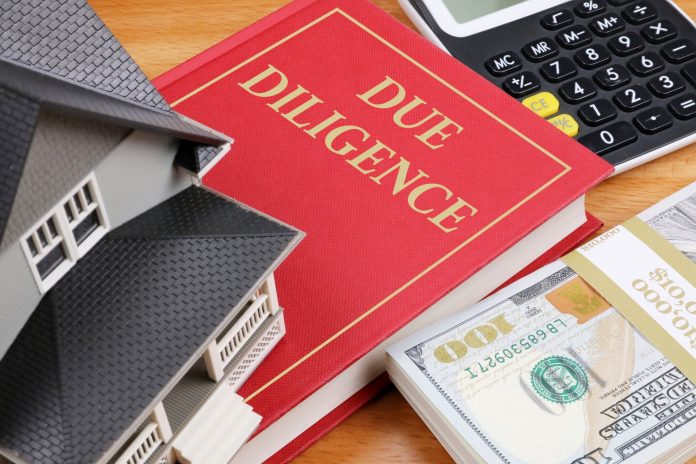Due diligence is the process of investigating and verifying information about a business or person prior to signing an agreement. The term is frequently used in many types of transactions, including real estate purchases, where it may include legal research, title searches, and resolving liens on the property.
Personal investigation
Due diligence is also widely known as one’s personal investigation into the credibility of another party before entering into an agreement with them.
An example can be seen when purchasing a house, due diligence would involve speaking to previous owners’ landlords or local authorities to make sure they are not connected to any crime/criminal activities for instance. The purpose of due diligence is to increase the amount of certainty surrounding the truth or accuracy of claims made by another party. It has been described as an attempt to find facts that reduce or eliminate the unknown risk in business deals.
Substantial harm
Due diligence is defined under section 2 of the Civil Law Act 1977 (SA) which states: “Substantial harm” means damage of any kind, including loss by not taking an appropriate precaution. A consequence is that the same obligation of care applies both during active negotiations and settlement of a contract. This imposes a duty upon parties to investigate all issues material to the proposed agreement, including information that may be only non-specific in nature. A lack of due diligence can be costly where loss or damage arises out of reliance on inaccurate information.
Performing due diligence
The main aim for performing due diligence, when it comes to real estate purchases, is to increase certainty about the truth or accuracy of any claims made by another party. This is done by looking into things like a property’s title, liens, zoning and other legal restrictions that may be in place. In some cases, it may also be necessary to investigate the background of the seller or buyer in order to assess any potential risks involved in the deal.
Transacting in real estate
It’s important for both buyers and sellers to perform due diligence when transacting in real estate. Buyers can avoid costly mistakes by uncovering any potential problems with the property they’re interested in, while sellers can protect themselves from any legal action that may be taken against them after the sale is complete.
Risk management
Performing due diligence is just one part of a larger process known as risk management. This is the practice of assessing and mitigating potential risks before they have a chance to affect your business. By taking a proactive approach to risk management, you can reduce the likelihood of unpleasant surprises down the road and protect your company’s bottom line.
Due diligence is an important part of any real estate transaction
Performing due diligence is an important part of any real estate transaction. By investigating all issues material to the deal, you can reduce the amount of unknown risk involved in the transaction. It’s also a good way to protect yourself from any legal action that may be taken against you after the sale is complete. For buyers, due diligence can help them avoid costly mistakes, while sellers can use it as a way to mitigate any potential risks involved in the sale.
Although the word “due” may suggest that you must be absolutely certain about something before taking action, this isn’t true of due diligence. The term simply means to take care of what you do. If there is a risk involved when carrying out a particular activity, it’s your responsibility to take reasonable steps in order to prevent any problems from arising.
If you don’t want to lose your shirt when buying real estate, make sure to perform due diligence beforehand. But if you’re trying to do something without any possibility of anything going wrong, then doing due diligence doesn’t matter very much at all because no harm can come from not being careful.
If you are playing chess with a toddler
For example, if you are playing chess with a toddler who doesn’t even know how to move the pieces yet, it’s probably not necessary for me to take any time or effort in order to perform due diligence. I’d be wasting my breath because there’s no possible way that my opponent could harm me even if their moves were completely unsupervised.
On the other hand, if I’m playing chess with Magnus Carlson one of the world’s top players – then it would definitely be worth my while to perform due diligence beforehand. He might seem like a nice guy at first glance, but he could easily wipe out an entire army before you even realize what happened.
Read More: What Is Wholesale Real Estate? Wholesale Real Estate For Beginners
It doesn’t always mean that you need to carry out some kind of detailed
You should mention though that performing due diligence doesn’t always mean that you need to carry out some kind of detail on every single aspect of a property. Sometimes, a quick look at the property’s title or zoning will be enough to give you a good idea of what’s going on. The key is to be systematic and thorough in your approach so that you don’t miss anything important.
It is a vital step that helps protect both buyers and sellers
The due diligence process in real estate is a vital step that helps protect both buyers and sellers from any potential problems that may arise during the transaction. This process includes investigating all aspects of the property, from the legal to the financial status of the property. By doing this, both parties can be sure that they are fully aware of what they are getting into and can make an informed decision about whether or not to proceed with the purchase or sale.
The due diligence process typically begins with a review of the property’s title. The title must be clear and free of any liens or other claims in order for the sale to go through. The bottom line is that due diligence should never be taken lightly, it’s an essential part of any real estate transaction, and can help to mitigate any potential risks involved. By being proactive and investigating all material issues, you can make an informed decision about whether or not to move forward with a purchase.










